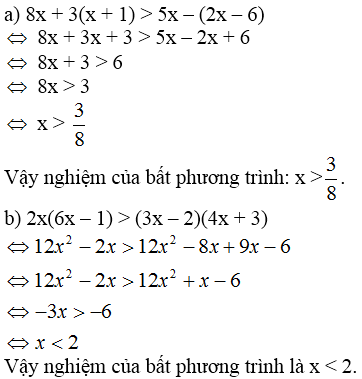Giải phương trình
\(\left(6x^2-5x+1\right)\left(x^2-5x+6\right)=4x^2\)

Những câu hỏi liên quan
giải phương trình :
a, \(\left(\sqrt{5x-1}+\sqrt{x-1}\right)\left(3x-1-\sqrt{5x^2-6x+1}\right)=4x\)
b, \(2\left(\sqrt{x}-\sqrt{x-1}\right)\left(1+\sqrt{x^2-1}\right)=x\sqrt{x}\)
giải phương trình :
a, \(\left(\sqrt{5x-1}+\sqrt{x-1}\right)\left(3x-1-\sqrt{5x^2}-6x+1\right)=4x\)
b, \(2\left(\sqrt{x}-\sqrt{x-1}\right)\left(1+\sqrt{x^2-1}\right)=x\sqrt{x}\)
giải phương trình :
a, \(\dfrac{4x-1}{\sqrt{4x-3}}+\dfrac{11-2x}{\sqrt{5-x}}=\dfrac{15}{2}\)
b, \(\left(\sqrt{5x-1}+\sqrt{x-1}\right)\left(3x-1-\sqrt{5x^2-6x+1}\right)=4x\)
giải các phương trình sau
a) \(\log_5\left(4x-3\right)=2\)
b) \(\log_2x^2=2\)
c) \(\log_5\left(2x+1\right)=\log_5\left(-2x+3\right)\)
d) \(\ln\left(x^2-6x+7\right)=\ln\left(x-3\right)\)
e) \(\log\left(5x-1\right)=log\left(4-2x\right)\)
a: ĐKXĐ: \(4x-3>0\)
=>x>3/4
\(log_5\left(4x-3\right)=2\)
=>\(log_5\left(4x-3\right)=log_525\)
=>4x-3=25
=>4x=28
=>x=7(nhận)
b: ĐKXĐ: \(x\ne0\)
\(log_2x^2=2\)
=>\(log_2x^2=log_24\)
=>\(x^2=4\)
=>\(\left[{}\begin{matrix}x=2\left(nhận\right)\\x=-2\left(nhận\right)\end{matrix}\right.\)
c: ĐKXĐ: \(x\notin\left\{-\dfrac{1}{2};\dfrac{3}{2}\right\}\)
\(\log_52x+1=\log_5-2x+3\)
=>2x+1=-2x+3
=>4x=2
=>\(x=\dfrac{1}{2}\left(nhận\right)\)
d: ĐKXD: \(x\notin\left\{3\right\}\)
\(ln\left(x^2-6x+7\right)=ln\left(x-3\right)\)
=>\(x^2-6x+7=x-3\)
=>\(x^2-7x+10=0\)
=>(x-2)(x-5)=0
=>\(\left[{}\begin{matrix}x=2\left(nhận\right)\\x=5\left(nhận\right)\end{matrix}\right.\)
e: ĐKXĐ: \(x\notin\left\{\dfrac{1}{5};2\right\}\)
\(log\left(5x-1\right)=log\left(4-2x\right)\)
=>5x-1=4-2x
=>7x=5
=>\(x=\dfrac{5}{7}\left(nhận\right)\)
Đúng 1
Bình luận (0)
Giải các phương trình sau:a) left(x^2+4x+8right)^2+3xleft(x^2+4x+8right)+2x^20b)left(6x+7right)^2left(3x+4right)left(x+1right)6c) left(x-2right)^4+left(x-6right)^482d) 2x^4-5x^3+6x^2-5x+20e) 2x^4+x^3-6x^2+x+20f) x^4+2x^3+4x^2+2x+10đố ai giải được hết!!
Đọc tiếp
Giải các phương trình sau:
a) \(\left(x^2+4x+8\right)^2+3x\left(x^2+4x+8\right)+2x^2=0\)
b)\(\left(6x+7\right)^2\left(3x+4\right)\left(x+1\right)=6\)
c) \(\left(x-2\right)^4+\left(x-6\right)^4=82\)
d) \(2x^4-5x^3+6x^2-5x+2=0\)
e) \(2x^4+x^3-6x^2+x+2=0\)
f) \(x^4+2x^3+4x^2+2x+1=0\)
đố ai giải được hết!!
chẳng ai giải, thôi mình giải vậy!
a) Đặt \(y=x^2+4x+8\),phương trình có dạng:
\(t^2+3x\cdot t+2x^2=0\)
\(\Leftrightarrow t^2+xt+2xt+2x^2=0\)
\(\Leftrightarrow t\left(t+x\right)+2x\left(t+x\right)=0\)
\(\Leftrightarrow\left(2x+t\right)\left(t+x\right)=0\)
\(\Leftrightarrow\left(2x+x^2+4x+8\right)\left(x^2+4x+8+x\right)=0\)
\(\Leftrightarrow\orbr{\begin{cases}x=-2\\x=-4\end{cases}}\)vậy tập nghiệm của phương trình là:S={-2;-4}
b) nhân 2 vế của phương trình với 12 ta được:
\(\left(6x+7\right)^2\left(6x+8\right)\left(6x+6\right)=72\)
Đặt y=6x+7, ta được:\(y^2\left(y+1\right)\left(y-1\right)=72\)
giải tiếp ra ta sẽ được S={-2/3;-5/3}
c) \(\left(x-2\right)^4+\left(x-6\right)^4=82\)
S={3;5}
d)s={1}
e) S={1;-2;-1/2}
f) phương trình vô nghiệm
Đúng 0
Bình luận (0)
giải phương trình \(x^3-5x^2+4x-5=\left(1-2x\right)\sqrt[3]{6x^2-5x+7}\)
Giải các phương trình sau
a) \(\left(6x^2-5x+1\right)\left(x^2-5x+6\right)=4x^2\)
b) \(\sqrt{2\left(x^4+4\right)}=3x^2-10+6\)
a/
\(\left(2x-1\right)\left(3x-1\right)\left(x-2\right)\left(x-3\right)=4x^2\)
\(\Leftrightarrow\left(2x-1\right)\left(x-2\right)\left(3x-1\right)\left(x-3\right)=4x^2\)
\(\Leftrightarrow\left(2x^2-5x+2\right)\left(3x^2-10x+3\right)=4x^2\)
\(\Leftrightarrow\left(6x^2-15x+6\right)\left(6x^2-20x+6\right)=24x^2\)
Nhận thấy \(x=0\) không phải nghiệm, chia 2 vế cho \(x^2\):
\(\left(6x+\frac{6}{x}-15\right)\left(6x+\frac{6}{x}-20\right)=24\)
Đặt \(6x+\frac{6}{x}-20=a\Rightarrow6x+\frac{6}{x}-15=a+5\)
\(\left(a+5\right)a-24=0\Leftrightarrow a^2+5a-24=0\) \(\Rightarrow\left[{}\begin{matrix}a=3\\a=-8\end{matrix}\right.\)
\(\Leftrightarrow\left[{}\begin{matrix}6x+\frac{6}{x}-20=3\\6x+\frac{6}{x}-20=-8\end{matrix}\right.\) \(\Leftrightarrow\left[{}\begin{matrix}6x^2-23x+6=0\\6x^2-12x+6=0\end{matrix}\right.\)
\(\Rightarrow\left[{}\begin{matrix}x=\frac{23\pm\sqrt{385}}{12}\\x=1\end{matrix}\right.\)
Đúng 0
Bình luận (0)
b/
\(3x^2-10x+6-\sqrt{2\left(x^4+4x^2+4-4x^2\right)}=0\)
\(\Leftrightarrow x^2-6x+2+2\left(x^2-2x+2\right)-\sqrt{2\left(x^2-2x+2\right)\left(x^2+2x+2\right)}=0\)
\(\Leftrightarrow x^2-6x+2+\sqrt{2\left(x^2-2x+2\right)}\left(\sqrt{2\left(x^2-2x+2\right)}-\sqrt{x^2+2x+2}\right)=0\)
\(\Leftrightarrow x^2-6x+2+\sqrt{2\left(x^2-2x+2\right)}\left(\frac{x^2-6x+2}{\sqrt{2\left(x^2-2x+2\right)}+\sqrt{x^2+2x+2}}\right)=0\)
\(\Leftrightarrow\left(x^2-6x+2\right)\left(1+\frac{\sqrt{2\left(x^2-2x+2\right)}}{\sqrt{2\left(x^2-2x+2\right)}+\sqrt{x^2+2x+2}}\right)=0\)
\(\Leftrightarrow x^2-6x+2=0\) (ngoặc to phía sau luôn dương)
\(\Rightarrow\left[{}\begin{matrix}x=3+\sqrt{7}\\x=3-\sqrt{7}\end{matrix}\right.\)
Đúng 0
Bình luận (0)
Giải các phương trình sau :
a)\(\dfrac{5x+2}{6}\)\(-\dfrac{8x-1}{3}=\dfrac{4x+2}{5}-5\)
b)\(\dfrac{x+2}{x-2}-\dfrac{1}{x}=\dfrac{2}{x\left(x-2\right)}\)
c)\(2x^3 +6x^2=x^2+3x\)
d)\(\left|x-4\right|+3x=5\)
`a,` \(\dfrac{5x+2}{6}-\dfrac{8x-1}{3}=\dfrac{4x+2}{5}-5\)
`<=> (5(5x+2))/30 - (10(8x-1))/30 = (6(4x+2))/30 - (5.30)/30`
`<=> 5(5x+2) - 10(8x-1) =6(4x+2) - 5.30`
`<=> 25x + 10 - 80x + 10 = 24x+12 - 150`
`<=> -55x +20 = 24x-138`
`<=> -55x -24x=-138-20`
`<=>-79x=-158`
`<=> x=2`
Vậy pt có nghiệm `x=2`
`b,` \(\dfrac{x+2}{x-2}-\dfrac{1}{x}=\dfrac{2}{x\left(x-2\right)}\)
ĐKXĐ : \(\left\{{}\begin{matrix}x-2\ne0\\x\ne0\end{matrix}\right.\Leftrightarrow\left\{{}\begin{matrix}x\ne2\\x\ne0\end{matrix}\right.\)
Ta có : `(x+2)/(x-2) -1/x = 2/(x(x-2))`
`<=> (x(x+2))/(x(x-2)) - (x-2)/(x(x-2)) = 2/(x(x-2))`
`=> x^2 +2x - x +2 = 2`
`<=> x^2 + x =0`
`<=>x(x+1)=0`
\(\Leftrightarrow\left[{}\begin{matrix}x=0\\x+1=0\end{matrix}\right.\)
\(\Leftrightarrow\left[{}\begin{matrix}x=0\left(l\right)\\x=-1\end{matrix}\right.\)
Vậy pt có nghiệm `x=-1`
`c,2x^3 + 6x^2 =x^2 +3x`
`<=> 2x^3 + 6x^2 -x^2 -3x=0`
`<=> 2x^3 + 5x^2 -3x=0`
`->` Đề có sai ko ạ ?
`d,` \(\left|x-4\right|+3x=5\) `(1)`
Thường hợp `1` : `x-4 >= 0<=> x >=0` thì phương trình `(1)` thở thành :
`x-4 = 5-3x`
`<=> x+3x=5+4`
`<=> 4x=9`
`<=> x= 9/4 (t//m)`
Trường hợp `2` : `x-4< 0<=> x<0` thì phương trình `(1)` trở thành :
`-(x-4) =5-3x`
`<=> -x +4=5-3x`
`<=> -x+3x=5-4`
`<=> 2x =1`
`<=>x=1/2 ( kt//m)`
Vậy phương trình có nghiệm `x=9/4`
Đúng 1
Bình luận (0)
đây là phương trình mà đâu phải bất phương trình đâu
Đúng 1
Bình luận (0)
Giải các bất phương trình :
a) \(8x+3\left(x+1\right)>5x-\left(2x-6\right)\)
b) \(2x\left(6x-1\right)>\left(3x-2\right)\left(4x+3\right)\)
a) \(8x+3\left(x+1\right)>5x-\left(2x-6\right)\)
⇒ \(8x + 3x + 3 > 5x - 2x + 6\)
⇒ \(11x+3>3x+6\)
⇒ \(11x - 3x > 6 -3\)
⇒ \(8x > 3\)
⇒ \(8x.\dfrac{1}{8}>3.\dfrac{1}{8}\)
⇒ \(x>\dfrac{3}{8}\)
S = \(\left\{x\backslash x>\dfrac{3}{8}\right\}\)
b) \(2x(6x-1) > (3x -2)(4x+3)\)
⇒ \(12x^2 - 2x > 12x^2 +9x -8x -6\)
⇒ \(12x^2 - 2x > 12x^2 + x - 6\)
⇒ \(-2x-x>12x^2 -6-12x^2\)
⇒ \(- 3x > -6 \)
⇒ \(x > 2\)
S = {x / x > 2}
Đúng 0
Bình luận (0)
a,\(8x+3\left(x+1\right)>5x-\left(2x-6\right)\)
\(\Leftrightarrow8x+3x+3>5x-2x+6\)
\(\Leftrightarrow8x+3x-5x+2x>6-3\)
\(\Leftrightarrow8x>3\)
\(\Leftrightarrow x>\frac{3}{8}\)
b,\(2x\left(6x-1\right)>\left(3x-2\right)\left(4x+3\right)\)
\(\Leftrightarrow12x^2-2x>12x^2+9x-8x-6\)
\(\Leftrightarrow12x^2-2x-12x^2-9x+8x>-6\)
\(\Leftrightarrow-3x>-6\)
\(\Leftrightarrow x>2\)
Đúng 0
Bình luận (0)






















